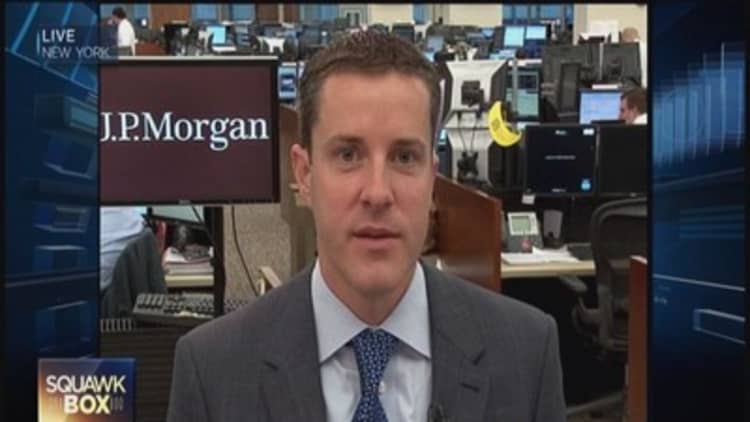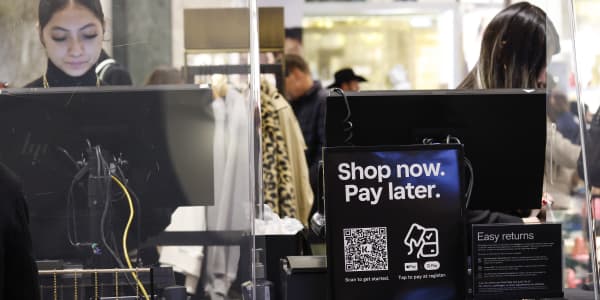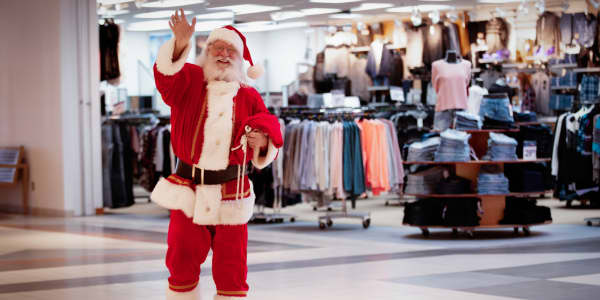Shoppers are planning to spend more this holiday, but there's one person they won't be splurging on: themselves.
The National Retail Federation on Thursday released its annual holiday spending survey, which found that the average person celebrating Christmas, Kwanzaa or Hanukkah will spend $804.42 this season—an increase of nearly 5 percent from last year's average of $767.27.
The majority of consumers' increased wallet share is expected to go toward buying gifts for others, as self-gifting—the idea of shoppers picking up additional items for themselves while they're purchasing presents for family and friends—is expected to decline from an average $134.77 in 2013, to $126.68.
It's the second year in a row the "one for you, one for me" mentality has taken a hit amid the stagnant economic recovery. The number of people who plan to buy nongift items either for themselves or others was relatively flat, near 57 percent.
Read MoreWhat's in store for Christmas? Depends who you ask
"Overall, consumers feel better about where they stand compared to a year ago, and as such could find themselves stretching their dollars," said Pam Goodfellow of Prosper Insights & Analytics, the firm that conducted the study. "Retailers, however, should still expect to see high demand for sales, coupons and other promotions as shoppers focus on 'what's in it for them.'"
Self-purchases are typically a key component driving healthy holiday sales. In conjunction with its holiday forecast last month, Deloitte's Alison Paul said the firm's projected 4 percent to 4.5 percent sales growth this season factored in a boost in these sorts of impulse purchases.
NRF spokeswoman Kathy Grannis said that while the trade association was a little surprised by the expected drop in self-gifting, the trend tends to be bigger when the economy is bad, because people spend more time looking for low prices for items they need, but have delayed buying.
"When confidence improves, consumers are a lot less reliant on those deep discounts to shop for themselves," she said.
Read MoreHoliday boost may not help these three retailers
Overall, 4 in 10 respondents said the state of the economy would impact their holiday spending—a decline of nearly 20 percent from 2014, and the lowest percentage since the group started asking the question in 2009.
NRF's survey polled 7,547 consumers from Oct.1 to Oct. 7, and has a margin of error of plus or minus 1.2 percentage points.
Earlier this month, the group predicted overall holiday sales will increase 4.1 percent to $616.9 billion.
Getting an early start on deals
Although some shoppers will undoubtedly wait until the last minute, NRF's most recent study found that many consumers will start early this year, mostly to spread out their spending. About 4 in 10 people will once again begin their holiday shopping before Halloween, and 40.9 percent will begin in November—a slight uptick from last year.
Read MoreWill consumers come to economy's rescue?
Multiple firms are predicting that the Thanksgiving Day and Black Friday weekend events will be particularly significant this year. A report released Wednesday by The NPD Group found that a larger number of consumers are waiting until Thanksgiving weekend to start their holiday shopping, in order to capitalize on deals.

A similar study by Accenture found that "consumer enthusiasm for Black Friday shopping has reached its highest level in eight years," with two-thirds of respondents saying they are likely to shop on Black Friday. That compares with 55 percent last year. Plans to shop on Thanksgiving Day and evening rose to 45 percent, from 38 percent last year, according to Accenture.
Read MoreThanksgiving wars: Macy's to open at 6 pm
"Consumers are anticipating the Thanksgiving weekend doorbuster deals and other savings incentives," said Marshal Cohen, chief industry analyst at The NPD Group.
Retailers are already responding to this demand. Macy's on Tuesday said that it will open at 6 p.m. on Thanksgiving Day—two hours earlier than last year—and Cohen said he expects more stores to jump on the trend. Last year, retailers such as and J.C. Penney were also open on Thanksgiving Day.
"It's important to keep in mind that this doesn't mean more sales at the register," Cohen said. "This year we'll see more shopping happening in the Thanksgiving zone, a deeper lull following and finally a mad dash at the end for the last-minute shoppers."
Separately, both NPD and NRF are anticipating a big year for online shopping. NPD said that 60 percent of people plan to shop online this holiday, while NRF said 56 percent will shop online—up from 51.5 percent last year and the most in the 13-year history of its survey.





